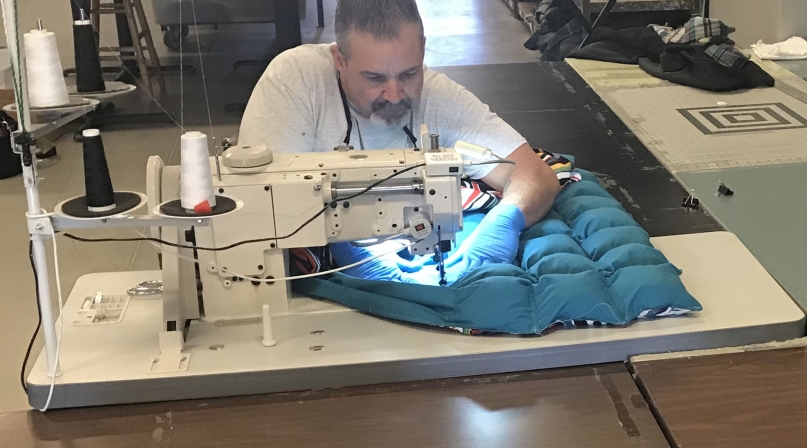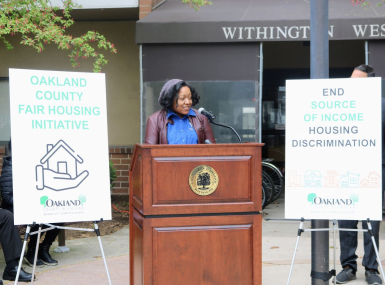Weighted blanket project lets inmates help patients in state, local care

Weighted blankets sewn by Idaho inmates bring comfort to state hospital patients, foster children, disaster victims
Sleep was always trouble for Rick Winkel’s 11-year-old granddaughter Cadence. Ever since he and his wife became her guardians, they saw her emotional turmoil make napping impossible, even years after suffering trauma. She often woke them in the middle of the night following bad dreams and was generally anxious.
“We were on a fixed income and didn’t have the money to spend on a shot in the dark to help her,” Winkel said. “But in seven years, I’d never seen her sleep in the daytime unless she was sick.”
Do More
In early 2017, Winkel began his term as a Clearwater County, Idaho commissioner and started serving on the advisory board for the State Hospital North — where an administrator offered to lend him a blanket, weighed down with polypropylene pellets sewed into pockets on the blanket. When laid on a person’s chest, it has a calming effect similar to being gently hugged. The Winkels gave it a try with Cadence.
“In an hour, she was curled up, half on the couch half on a floor, out like a light,” Winkel said. “We woke her up after a few hours and were worried she might not sleep through the night, but sure enough, we used the blanket again and she did just fine.”
Studies have shown that weighted blankets can help manage the symptoms of autism, post-traumatic stress disorder, sleep disorders, anxiety and nervous system disorders.
The Winkels found what has been a game changer for their family, and what will give a great measure of comfort to many families throughout Idaho as a new cooperative program, now coordinated by the Idaho Association of Counties, grows.
Along with Winkel, two other county officials and three former county officials serve on the psychiatric hospital’s advisory board; also on the board is the mother of a former patient. That mother sewed her own weighted blanket for her child at home and tried to do more before telling the advisory board that her sewing machine at home couldn’t handle the demand.
“One of our board members was connected to the state corrections system, and he knew who we could talk to, who could get the inmates who are making quilts to add the pellets,” said Michele Chadwick, the advisory committee chairwoman and a former Gem County commissioner. “It was really a case of the right people being in the room together and making a connection.”
Two state prisons have industrial sewing machines. One prison produces four blankets a month, which go to State Hospital North, with some patients taking them home after being discharged. The other prison produces two blankets every week, which go to sheriff’s offices.
“A lot of times, our first responders don’t have the tools to comfort people in traumatic situations,” Chadwick said. “This will be something they can put around a child’s, or an adult’s, shoulders to help them in the moment and going forward when they are going through a lot.”
Additional blankets will be distributed to foster care programs, to help foster children adjust to their new living situations. The Idaho Association of Counties is collecting materials and donated shipments of polystyrene pellets, and distributing materials to participating prisons.
“It’s a win-win, because the inmates are able to contribute something to really help people, and these blankets will be a big quality of life boost for people in need,” Chadwick said.
Winkel agreed, based on his own experiences with Cadance.
“You have a life to lead, so you can’t hold onto your kids 24 hours a day, even if you want to,” he said. “I know for my granddaughter, it’s made a difference not just for sleeping but for being able to manage her stress in a way we take for granted. These blankets can help a lot of families.”
And their production could help inmates. Tennessee-based Red Barn Blankets has sent donations of supplies and has expressed interest in contracting with inmates upon their release to produce blankets for sale, according to Kelli Brassfield, the state association’s government affairs associate.
Attachments
Related News

Information-sharing bill could protect court workers
The Countering Threats and Attacks on Our Judges Act could provide more than 30,000 state and local judges with access to security assessments, best practices and a database of threats made against colleagues in the justice field.

Commissioner fights for ‘forgotten’ township
Yolanda Smith Charles has championed a small municipality in her Oakland County, Mich. district that has been dismantled as others grow.

California counties fight agricultural crime
Sheriffs' offices and prosecutors in California's central valley make specific efforts to prevent and prosecute crimes against the agricultural community.
